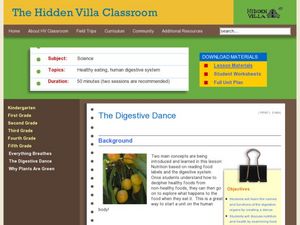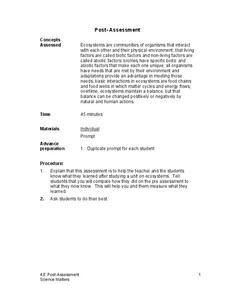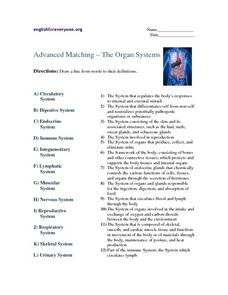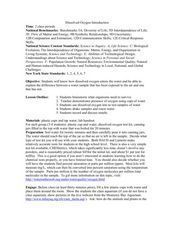Curated OER
Pesticide Watch Card
Students examine human health by identifying dangerous pesticides. In this agriculture lesson, students research the food production system in the United States and discuss dangers such as pesticides, chemicals and insecticides which...
Captain Planet Foundation
Energy Flow in the Garden
How can you tell what an owl has eaten? Study the food chain and flow of energy in an ecosystem by dissecting an owl pellet and noting the bones found inside. Additionally, the lesson includes a game about consumers and producers with a...
Curated OER
Food Webs
Sixth graders discuss and describe consumers and producers. They discuss and describe predator-prey relationship. Students review food chains. They form a circle, and each student is given an ecosystem card. Student at the top is given...
Curated OER
Genetically Modified Food (GMF)
Explore genetically modified foods through various experiments. In this biology activity, students discuss the safety issues related to GMF's. They conduct a PCR analysis to identify the presence of genetic modification.
Curated OER
The Plant Food Factory
Plants need sun and water to survive. Let kids discover these facts by reading a block of informational text and considering a scientific quandary. They read the text, then use the information to complete a two-part question about plant...
Curated OER
The Digestive Dance
Students read food labels to compare healthy verses non healthy food and then use diagrams to create a poster of the digestive system. In this food lesson plan, students move the food down the digestive track along the digestive system.
National Park Service
Living & Non-Living Interactions
What better way to learn about ecosystems than by getting outside and observing them first hand? Accompanying a field trip to a local park or outdoor space, this series of collaborative activities engages children in learning about the...
Kentucky School for the Deaf
Levels of Organization within an Ecosystem
From tiny organisms to entire biomes, young scientists examine the interdependent relationships tying all living and non-living things together with this collection of ecology resources.
Channel Islands Film
Human Impact on the Food Web of Santa Cruz Island
What happens when a non-native species is introduced onto an island? Santa Cruz Island, part of the Channel Island chain located off the coast of southern California, provides the perfect laboratory for young environmental scientists to...
Learning Games Lab
Testing and Adjusting pH
Pupils learn how to control food spoilage by adjusting the food's pH. They see that one of the most dangerous bacteria can grow in food if people don't handle and store food properly. Using knowledge of the bacteria's preferred pH,...
Curated OER
Food Chain/Food Web
Students explore ecosystems. In this ecology lesson plan, students read an article explaining ecosystems. Students create a visual organizer with index cards using components of various ecosystems.
Curated OER
Food Chains & Food Webs
Tenth graders examine how energy is lost through different trophic levels. In this trophism lesson students construct a food web and view a video.
Science Matters
Post-Assessment
Twenty questions make up an assessment designed to test super scientists' knowledge of ecosystems. Scholars answer multiple-choice and short-answer questions about organisms, food chains, energy flow, and more.
Curated OER
Owls: Top of a Food Chain
Although written for middle schoolers, there is no reason that a 3rd, 4th, or 5th grader could not also learn about food chains through the dissection of owl pellets. After you introduce the topic, learners complete an owl research...
Curated OER
Dinnertime for Animals
Is a deer an herbivore? What about a spider? Experiment with the food chain in an interactive science experiment. After listing the herbivores from a selection of animals, third and fourth graders compare the skulls and teeth of...
Curated OER
Advanced Matching - The Organ Systems
What's the difference between the digestive system and the endocrine system? Explore 12 body systems in this anatomy matching worksheet, for which learners find descriptions corresponding to anatomical terminology. Some of the...
National Wildlife Federation
Habitat Web
Young scientists weave together an understanding of ecosystems with this fun collaborative activity. Taking on the roles of different living and non-living elements of specific habitats, learners use a ball of yarn to create the web of...
Curated OER
Breaking the Food Chain
Students investigate the food chain. They brainstorm questions about the human food chain and explain what would happen to living things in the food chain if organisms or resources were removed. They role-play situations in which the...
Curated OER
Food Web
Students are able to define food web, and identify the interdependence of organisms within a system. They are able to describe how natural events and human activities can impact a food web.
Curated OER
Dissolved Oxygen Introduction
Students are shown how dissolved oxygen enters the water. They are taught the difference between a water sample that has been exposed to the air and one that has not. Students brainstorm what organisms need to survive. They use dissolved...
Captain Planet Foundation
Sorting Out Soils
Sift through soil and learn about why it's important for organic processes. After discussing what makes up soil, such as the living organisms and what types of soil have more nutrients, kids sample layers of mulch and deeper soil to...
Consortium for Ocean Science Exploration and Engagement (COSEE)
Understanding the Food Web
Building on prior knowledge of the pervious lesson plan in the series, pupils explain the previous lesson plan to each other. Then they write a simple guide for a young child to read on the same topic.
Curated OER
Forest Food Chains and Webs
Students explore forest ecological systems. In this ecology lesson, students classify forest plants and animals according to their ecological roles. Students play a related vocabulary guessing game. Students choose a card on which a...
NNF
Floods Happen
Did you know that flooding is the most common natural disaster in the United States? Prepare your learners with the facts about floods and offer them the proper knowledge and tools for dealing with this type of emergency.

























